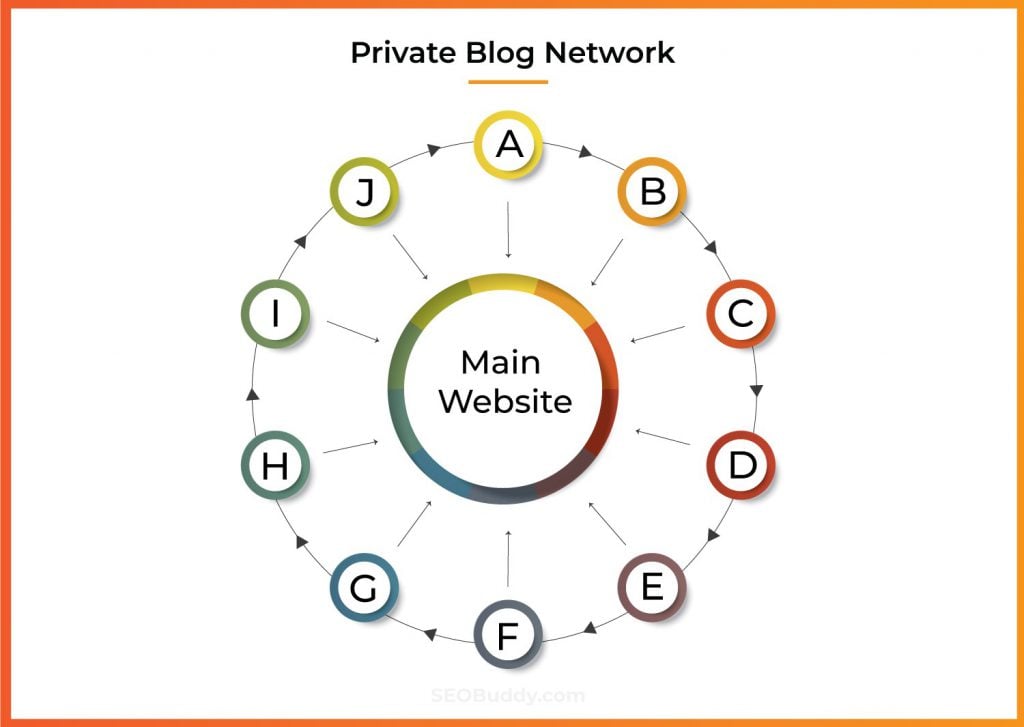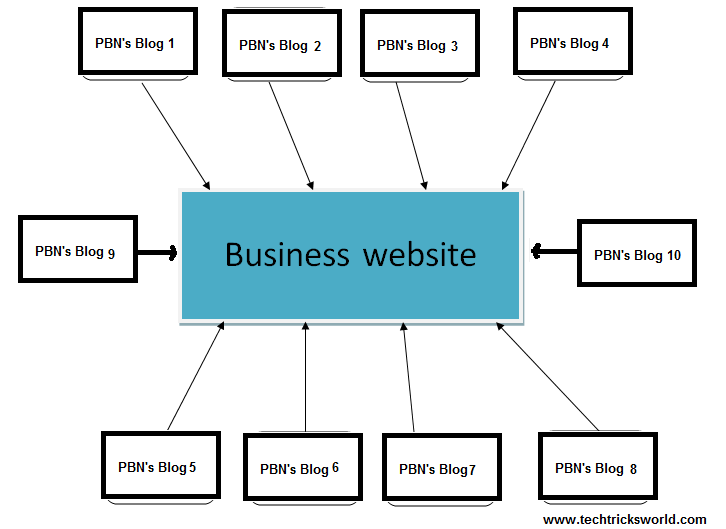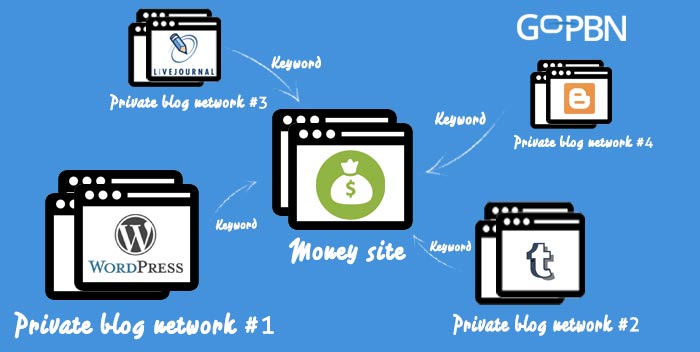Discover the secret world of private blog networks and learn how they can revolutionize your online presence and SEO strategy.

Image courtesy of via DALL-E 3
Table of Contents
Introduction to Private Blog Networks
In this section, we will introduce what a Private Blog Network (PBN) is and why it is used.
What is a PBN?
A Private Blog Network, commonly known as a PBN, is a group of interconnected blogs or websites that are owned by the same person or entity. These blogs are used to create backlinks to a main website, with the goal of boosting its search engine ranking.
Why Do Bloggers Use PBNs?
Bloggers use PBNs to improve the visibility and ranking of their websites on search engines like Google. By building a network of websites that link back to their main site, they can potentially increase their website’s authority and attract more visitors.
How a Private Blog Network Works
In this section, we will delve into the inner workings of a Private Blog Network (PBN) in a manner that is easy to understand for young readers.
Building the Network
Imagine a group of friends who all trust each other and help each other out. A PBN is like that, but with websites instead of friends. Bloggers connect multiple websites or blogs together to form a network. These websites can link to each other to boost each other’s ranking on search engines.
Creating Backlinks
Backlinks are like recommendations from one website to another. In a PBN, bloggers strategically place backlinks on different websites within the network to make them more popular to search engines. This helps to increase the visibility and ranking of all the websites in the network.
Increasing Website Ranking
When a website has many backlinks from other trustworthy websites, search engines like Google see it as more reliable and important. So, by using a PBN, bloggers can help their websites climb higher in search engine results, putting them in front of more people who are searching for information.
Components of a Private Blog Network
When setting up a Private Blog Network (PBN), there are several key components that are essential for its operation. Let’s explore these crucial elements that form the backbone of a successful PBN.

Image courtesy of seobuddy.com via Google Images
Domains
Domains are like the addresses of websites on the internet. They are unique identifiers that direct users to specific websites. In a PBN, selecting the right domains is critical. Bloggers often choose domains with strong backlink profiles and relevant keywords to boost SEO. The domains in a PBN should be diverse and not interconnected to maintain the network’s credibility.
Hosting
Hosting is the service that allows websites to be accessible on the internet. In a PBN, bloggers often use different hosting providers to avoid leaving a footprint that search engines could detect. It’s important to have reliable hosting for all the blogs in the network to ensure they are accessible to users and perform well on search engines.
Content
Content is the heart of any blog, including those in a PBN. High-quality, relevant, and unique content is crucial for the success of a PBN. Bloggers should regularly update the content on their blogs to keep them engaging and informative for readers. Well-crafted content can attract more visitors and improve the overall SEO performance of the PBN.
Pros and Cons of Using a Private Blog Network
Private Blog Networks offer several advantages to bloggers looking to boost their website’s ranking. One major benefit is the ability to have full control over the backlinks that direct to your site. This means you can strategically place links on related websites within the network to increase your visibility on search engines like Google. Additionally, PBNs can help speed up the process of climbing the search engine ranks, providing quicker results compared to traditional SEO methods. In essence, using a Private Blog Network can give your website a competitive edge and help you reach a larger audience faster.
Risks Associated with PBNs
While using a Private Blog Network can offer benefits, it also comes with potential risks that bloggers should consider. One significant risk is the violation of search engine guidelines. Search engines like Google frown upon unnatural link building practices, including the use of PBNs, and penalize websites that engage in such activities. This can result in a drop in search engine ranking or even getting completely removed from search results. Another risk is the time and effort involved in maintaining a PBN. Managing multiple blogs, creating quality content, and ensuring the network’s integrity can be a time-consuming task that requires constant attention and resources. Therefore, before deciding to use a Private Blog Network, it’s crucial to weigh the benefits against the risks and make an informed decision.
Ethics and Legality
In the world of blogging and website promotion, it’s crucial to discuss the ethical and legal aspects of using Private Blog Networks (PBNs). Let’s dive into the rules set by search engines like Google and understand the consequences of not playing by them.

Image courtesy of neilpatel.com via Google Images
Search Engine Guidelines
Search engines like Google have guidelines in place to maintain fairness and quality in their search results. These guidelines often prohibit the use of Private Blog Networks to manipulate rankings artificially. Search engines aim to provide users with the most relevant and reliable information possible, which is why they frown upon tactics that try to deceive their algorithms.
Consequences of Breaking Rules
If someone is caught using a Private Blog Network against the rules set by search engines, there can be severe repercussions. Websites that engage in such unethical practices may face penalties such as being removed from search engine results altogether. This means that all the hard work put into building the website and its rankings could go to waste, leading to a significant loss of traffic and visibility.
Alternatives to Private Blog Networks
While Private Blog Networks (PBNs) can be tempting for bloggers looking to boost their website’s ranking quickly, there are alternative methods that are more ethical and sustainable in the long run.
White Hat SEO Techniques
One alternative to using a PBN is employing White Hat SEO techniques. These are ethical practices approved by search engines like Google that focus on optimizing your website through legitimate means. This includes creating high-quality content, using relevant keywords, and building relationships with other websites.
Content Marketing
Content marketing involves creating valuable and engaging content for your website that naturally attracts visitors and builds your online reputation. By focusing on producing quality content that resonates with your audience, you can improve your website’s visibility and ranking without resorting to questionable tactics like PBNs.
Guest Blogging
Guest blogging is another effective strategy for gaining backlinks to your website from reputable sources. By contributing to other blogs in your niche, you can establish yourself as an authority in your field and drive traffic back to your own site. This not only improves your website’s ranking but also helps you build relationships within your industry.
Common Signs of a PBN
Spotting a Private Blog Network (PBN) can be tricky, but there are some telltale signs that can help you identify one:
1. Multiple websites with similar content: If you come across several websites that all have very similar content or themes, it could be a sign of a PBN. Genuine websites usually have unique content.
2. High quantity of outbound links: Websites within a PBN often have a high number of outbound links to other sites. This is done to manipulate search engine rankings, so be cautious if you see many outbound links on a website.
3. Low-quality content: PBN sites may have poorly written content or articles that don’t make much sense. This is because they are often created solely for the purpose of link building, rather than providing valuable information.
Tools for Detection
There are tools available that can help you detect if a website is part of a PBN:
1. Backlink Checker: Using a backlink checker tool can show you the sources of a website’s backlinks. If you notice that a website has a high number of backlinks from suspicious sources, it might be a part of a PBN.
2. IP Address Check: Websites within a PBN often share the same IP address. You can use online tools to check if multiple websites share the same IP address, indicating they might be part of a network.
3. Content Analysis: Analyzing the quality of the content on a website can also help you identify if it is part of a PBN. Look for poorly written content, irrelevant articles, or duplicate content across different sites.
How to Stay Safe Online
When you are online, it’s important to follow the rules set by search engines like Google. These rules are in place to ensure that websites provide accurate and helpful information to users. By following these guidelines, you are not only keeping yourself safe but also contributing to a better internet for everyone. Always remember that honesty and integrity are key when it comes to online behavior.

Image courtesy of gopbn.com via Google Images
Creating High-Quality Content
Instead of looking for quick fixes like Private Blog Networks, focus on creating high-quality content that is engaging and informative. By putting effort into your content, you can attract more visitors to your website organically. Write about topics that interest you and provide value to your readers. This way, you can build a loyal audience without resorting to unethical practices.
Conclusion
Private Blog Networks, or PBNs as they are commonly called, can be a powerful tool for bloggers and website owners to boost their online presence. In this article, we covered the basics of what a PBN is, how it works, its components, the pros and cons of using one, ethical considerations, alternatives to PBNs, how to identify a PBN, and tips for staying safe online. Let’s recap the key points we discussed:
Key Takeaways
1. A Private Blog Network (PBN) is a group of websites that are used to create backlinks and improve the ranking of a main website.
2. Building a PBN involves connecting multiple blogs or websites with strategic backlinks.
3. Domains, hosting, and content are essential components of a PBN.
4. While PBNs can help increase website visibility, they also come with risks such as potential penalties from search engines.
5. It is important to follow ethical and legal guidelines when using SEO strategies like PBNs.
6. There are alternative methods to boost website ranking, such as White Hat SEO techniques, content marketing, and guest blogging.
7. It is possible to spot a PBN by looking out for common signs and using detection tools.
8. Online safety and ethical behavior are paramount in the digital world, emphasizing the importance of quality content over shortcuts like PBNs.
By understanding the ins and outs of Private Blog Networks and the broader landscape of ethical SEO practices, young readers like you can navigate the online realm with knowledge and integrity. Remember, the key to success lies in creating valuable content and following the guidelines set forth by search engines. Stay curious, stay safe, and continue exploring the vast world of digital marketing!
Want to turn these SEO insights into real results? Seorocket is an all-in-one AI SEO solution that uses the power of AI to analyze your competition and craft high-ranking content.
Seorocket offers a suite of powerful tools, including a Keyword Researcher to find the most profitable keywords, an AI Writer to generate unique and Google-friendly content, and an Automatic Publisher to schedule and publish your content directly to your website. Plus, you’ll get real-time performance tracking so you can see exactly what’s working and make adjustments as needed.
Stop just reading about SEO – take action with Seorocket and skyrocket your search rankings today. Sign up for a free trial and see the difference Seorocket can make for your website!
Frequently Asked Questions (FAQs)
What happens if you get caught using a PBN?
Getting caught using a Private Blog Network (PBN) can have serious consequences. Search engines like Google have strict rules against manipulating search results, and if they discover that a website is part of a PBN, they can penalize it by lowering its ranking or even removing it from search results altogether. This means less traffic to the website and fewer people seeing the content. So, it’s essential to play by the rules and focus on creating high-quality content instead of trying to trick the system with PBNs.
Why don’t all bloggers use PBNs?
While some bloggers may see the short-term benefits of using a Private Blog Network (PBN), not all bloggers choose to go down that path. One reason is that PBNs can be risky, as search engines are constantly updating their algorithms to detect and penalize websites that engage in manipulative tactics like PBNs. Additionally, many bloggers prefer to focus on creating valuable content that genuinely resonates with their audience rather than relying on artificial methods to boost their ranking. It’s all about following ethical practices and building a sustainable online presence.
Is it hard to create a PBN?
Setting up a Private Blog Network (PBN) is not necessarily difficult, but it does require a significant amount of effort, time, and expertise. To create a PBN, you need to acquire multiple domains, set up websites with unique content on each, and interlink them strategically. Additionally, managing and maintaining a PBN entails ongoing work to ensure that the network appears natural and doesn’t raise any red flags with search engines. It’s also crucial to stay updated on search engine guidelines and best practices to avoid penalties. In short, creating a PBN is not just about technical skills but also about staying ethical and abiding by the rules of the online world.







